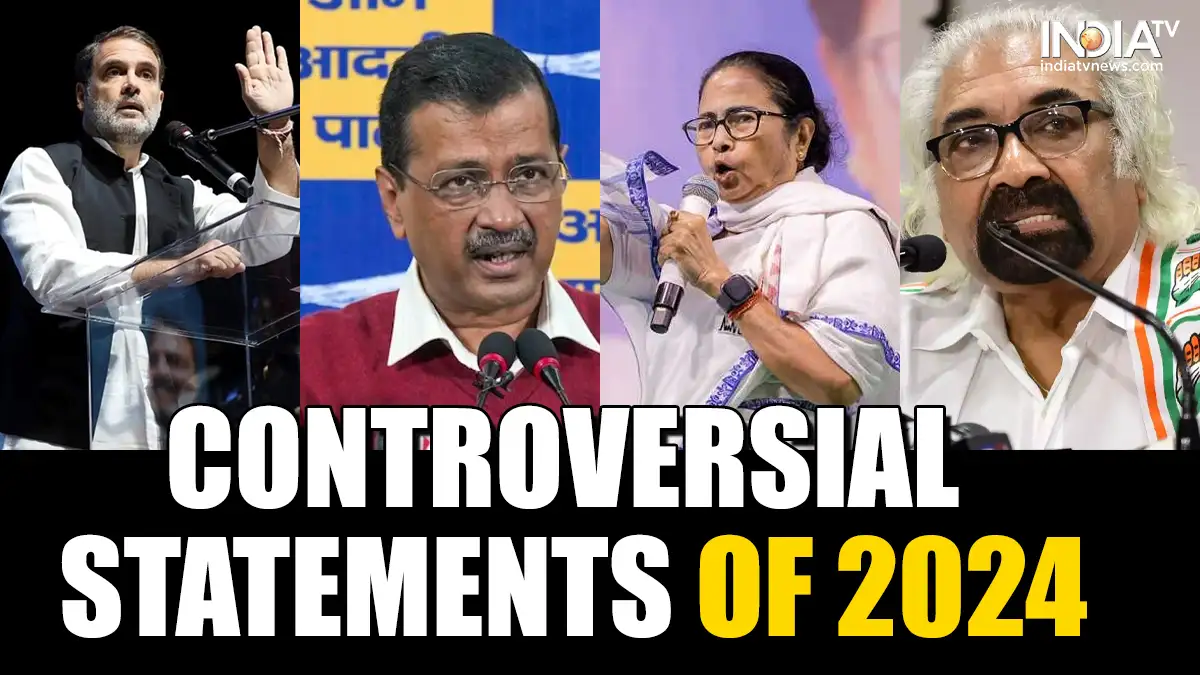
The year 2024 was marked by a series of contentious remarks from political leaders and prominent figures, each igniting intense debates across the nation. From allegations of undermining democratic institutions to comments stirring communal or social discord, these statements dominated headlines and polarized public opinion.
Congress leader Rahul Gandhi stood a step away from several politically sensitive remarks, but chief among them was his unpalatable “two types of soldiers” line and erroneous claims about religious freedom for minorities in India. And then, of course, there were the other figures such as Sam Pitroda and Sambit Patra, who got into the streets due to racially insensitive remarks or politically inciting them. And they would include Mamata Banerjee, Arvind Kejriwal, Mayawati, and others.
These comments will now remain as the year’s end approaches because they concern themselves with what is generally understood in India as a rhetoric in public discourse. Here’s looking at the most controversial statements of 2024. These are the very words that triggered protests and debates for and against them.
Rahul Gandhi’s ‘two types of soldiers’ comment
Congress leader Rahul Gandhi created a major controversy when he claimed that PM Modi had created “two types of soldiers” in India. According to Gandhi, one group comprised poor, Dalit, and minority soldiers (recruited under the Agniveer scheme) who were deprived of benefits like pensions and canteen facilities, while soldiers from rich families received all these privileges. His comment led to accusations of disrespecting the Indian Army, with the BJP lodging a formal complaint with the Election Commission.
Sam Pitroda’s inheritance tax remark
Sam Pitroda, former chairman of the Indian Overseas Congress, sparked outrage by advocating for the adoption of the inheritance tax system in India, similar to the one in the United States. He suggested that if a person accumulates significant wealth, a large portion should be handed over to the government upon their death. Many viewed his remarks as controversial, criticizing them as an attack on wealth creators and the Indian economic system.
Sam Pitroda’s ‘Racist’ Comment on Diversity
Pitroda further attracted controversy with his comments about India’s ethnic diversity. He stated that people in South India “look like Africans,” those in the East “look like Chinese,” and those in the West resemble Arabs. His remarks were widely condemned for their racial insensitivity and were seen as perpetuating harmful stereotypes about India’s diverse population.
Sambit Patra’s Lord Jagannath Remark
BJP leader Sambit Patra found himself in hot water after claiming that Lord Jagannath was a “bhakt” (devotee) of Prime Minister Narendra Modi. His comments were made during Modi’s roadshow in Puri, Odisha. Patra’s remark was seen as a controversial attempt to mix religion with politics and was criticized for disrespecting the religious sentiments of the people of Odisha.
Navneet Rana’s Threat to Akbaruddin Owaisi
BJP leader Navneet Rana sparked controversy by referencing a provocative statement from AIMIM leader Akbaruddin Owaisi, who had allegedly warned “100 crore Hindus” in 2013 that his community would show what it could do if the police were withdrawn for just 15 minutes. In response, Rana threatened that it would take just 15 seconds for Hindus to react. Her comment was widely seen as an incitement to violence and was condemned by many for escalating communal tensions.
Mamata Banerjee on “Voter Fraud” Allegations
West Bengal CM Mamata Banerjee stirred up controversy when she alleged large-scale voter fraud in her state, claiming that the BJP was trying to manipulate election results through illegal means. Her accusations were strongly criticized by her political opponents, who viewed them as an attempt to discredit the electoral process and undermine democracy.
Shashi Tharoor on ‘Hindu Taliban’
Congress leader Shashi Tharoor found himself embroiled in controversy after likening the ruling government in India to a “Hindu Taliban.” His remarks, made in the context of growing religious intolerance, were widely condemned for stoking communal discord. Tharoor later clarified that his comment was aimed at emphasizing the threat to India’s secular fabric, but it still ignited heated debates.
Arvind Kejriwal’s ‘Dictatorship’ Allegation
Delhi CM Arvind Kejriwal accused the central government of fostering a “dictatorship” in India, particularly criticising the curbing of state powers and the bypassing of elected state governments. His remarks were seen by many as an attack on the ruling party and were perceived as undermining India’s democratic institutions.
Mayawati’s Caste-Based Reservation Criticism
Bahujan Samaj Party (BSP) leader Mayawati triggered a heated debate when she suggested that caste-based reservations had lost their relevance and were contributing to divisions in society. This comment was met with strong reactions, with critics accusing her of undermining affirmative action and questioning her commitment to the cause of social justice for marginalized communities.
Rahul Gandhi’s Religious Freedom Comment in the US
Rahul Gandhi faced backlash after making factually incorrect statements about the religious freedom of minorities in India while speaking at an event in Herndon, Virginia. Gandhi claimed that in India, Sikhs were not allowed to wear turbans, carry kara (steel bangle), or visit gurdwaras. This comment was met with criticism from both the BJP and the Sikh community, who argued that these practices were freely followed in India. The community also pointed out that the only major threat to Sikh identity in India had occurred in 1984, during the anti-Sikh riots when Congress was in power.


